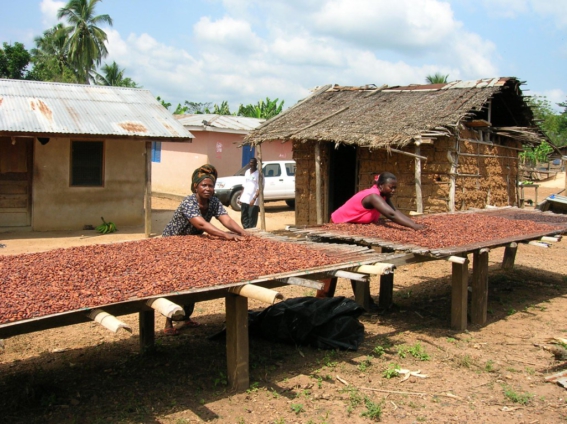Ghana, along with its neighboring cocoa powerhouses, has been grappling with an outbreak of black pod disease—a dreaded menace that causes cocoa pods to blacken and rot.
This has led to a rise in cocoa prices to a 13-year high, leaving farmers and experts grappling with the grim reality of a diminished harvest and compromised bean quality.
The disease has the potential to severely impact both the quality and quantity of cocoa beans produced. Fuad Mohammed Abubakar, the head of Ghana Cocoa Marketing Co., speaking to Bloomberg warned that the disease can prove catastrophic for the cocoa supply.
The leading cocoa-producing countries including Ivory Coast, Ghana and Nigeria, have witnessed a decline in cocoa shipments.

According to reports, Ivory Coast farmers have exported approximately 2.24 million tons of cocoa in the current season, slightly less than the 2.29 million tons recorded the previous year. The situation is causing ripples across the global cocoa market, with concerns about a potential shortage in supply and subsequent price hikes.
Reflecting the challenges faced by the cocoa industry in Ghana and West Africa, cocoa futures in London have soared by over 20% this year. Most-active futures reached £2,544 a ton, a figure not seen since mid-2010. In New York, cocoa futures also climbed 1.7% to $3,412, highlighting the global market's growing concern over the supply situation.
The situation is said to be mainly caused by heavy rainfall across West Africa, which has disrupted the harvest and exacerbated the spread of the black pod disease.
This weather phenomenon, characterized by hot and dry conditions, poses a significant risk to cocoa production.
This worrying trend is fueling fears that the anticipated smaller harvest may not be sufficient to make up for the shortfall experienced during the main crop harvest.
Ghana, alongside other West African nations, relies heavily on the two annual cocoa harvests to sustain its economy and meet global cocoa demands.
Sola Ogunsola, a Nigerian farmer, laments the impact on coastal cocoa farms, where many developing pods have been lost to the disease.
In addition to damaging the crops, the torrential rain has made roads impassable, hindering the transportation of chemicals for plantation treatment and cocoa delivery to ports.
Latest Stories
-
Suspected ‘witchdoctors’ arrested over attempt to ‘bewitch’ Zambia’s president
1 second -
Gambaga ‘Witches’ Camp women laud Lordina Foundation for lifesaving support
5 minutes -
Dusty dry air: EPA issues red alert; recommends nose mask wearing, less outdoor activities
12 minutes -
Economy to remain on recovery path but growth projected at 3.6% in 2025 – Databank
17 minutes -
BoG outlines draft open banking directive for regulated financial institutions
17 minutes -
Deloitte lists mining, financial services, 3 other sectors to watchout in 2025
21 minutes -
People voted because promises weren’t fulfilled – Egyapa Mercer on voter discontent
22 minutes -
Deloitte forecasts average inflation of 11.9% for Ghana in 2025
22 minutes -
T-bills: Government’s target fell short by GH¢58.11m; interest rates surged
26 minutes -
‘Ghana’s education sector is in crisis’ – President-Elect Mahama calls for national forum
32 minutes -
Ghanaian movies released in 2024
37 minutes -
Another deadly crush in Nigeria at event offering free food
44 minutes -
Cyclone Chido kills 94 people in Mozambique
53 minutes -
How tactless NDC exonerated the Electoral Commission
1 hour -
Tiger Woods’ son Charlie, 15, hits first hole-in-one
1 hour

